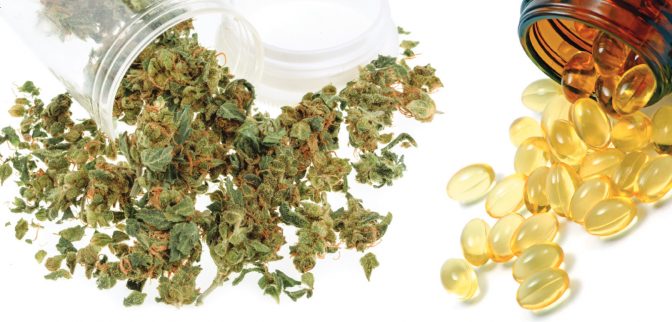The THC vs. CBD Conundrum

Congratulations, Ohio! In June, your governor signed a law legalizing medical marijuana (MMJ) for people in your state. Woo-hoo! Of course, you can’t grow your own THC medicine, or smoke a joint, but hey, it’s a good first step. But many activists in Ohio feel like this law doesn’t go far enough, and they have a point.
There are now 26 states with fairly broad MMJ laws, and another 16 that allow CBD (cannabidiol) only—meaning no THC in your weed. It sounds strange, but it’s true. These laws allow people with certain ailments, usually children with epilepsy, to use CBD oils but not the whole plant (CBD has been shown to be very effective in treating seizures). The usual argument for allowing CBD and not THC is that CBD doesn’t get people “high” like THC does, therefore CBD is a “real” medicine.
When it comes to medical marijuana’s side effects, being high is a pretty good deal; it’s way better than the side effects from many pharmaceutical medicines. If you take too much pot, you may feel hella weird for a while, but you won’t die.
It’s clear that these CBD-only laws are meant as a way for states to accommodate the clamor to allow medical cannabis use, while still restricting safe access to thousands of people that could be helped not just by CBD, but by THC, CBN and all the other beneficial cannabinoids found in the marijuana plant.
One of the things that makes cannabis so effective as a medicine is what’s known as “the entourage effect”: All the different cannabinoids and terpenes in a pot plant team up and act as a sort of posse, combining their powers and abilities to give more benefits than just one component of the plant alone. In fact, many parents of children with epilepsy report better results using a mixture of THC and CBD rather than CBD only.
That being said, any step toward recognizing the medical benefits of cannabis is one in the right direction. Still, sick people need more access to all kinds of cannabis products.
I understand that drug law reform is a long, arduous and tedious process. Overcoming years of anti-pot propaganda and obstruction from the willfully ignorant takes time. Even if the DEA moved marijuana from Schedule I to Schedule II, or removed it from the Controlled Substances Act completely, cannabis would still be illegal under many state laws.
There are literally thousands of laws across the U.S. that need to be changed. These things take time. Unfortunately, time is something that many cannabis patients don’t have.
If you enjoyed this Freedom Leaf article, consider subscribing today!

